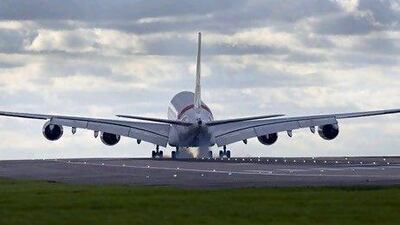Travel between the Middle East and Europe is expected soon to cost more, with airlines facing a controversial EU emissions trading scheme next year.
More Business news: Editor's pick of today's content
Industry Insights // Moroccan property takes a tumble Morocco's holiday home market was devastated by regional events, including a terrorist bombing, leaving several large-scale developments stalled. Read article
1,000 homes to boost sluggish sales market Aldar Properties has started handing over homes in Al Zeina on Raha Beach, one of the largest developments in the city open to international buyers. read article
The scheme, the world's largest multinational project to put a price on carbon dioxide emissions, will raise up to €1.1 billion (Dh5.67bn) a year, according to estimates by the ratings agency Standard & Poor's (S&P), although most airlines will be given allowances on existing operations.
It will tax any flight arriving on or departing from EU soil. However, airlines in the Gulf could face lower emissions charges than European airlines flying the same routes thanks to their younger and more fuel-efficient fleets.
Analysts said it was too early to estimate the effect on ticket prices. But Vivid Economics, based in London, said any additional costs were likely to be passed on to customers.
Some Middle Eastern airlines could benefit from the plan, however.
Gulf airlines that bypass Europe, such as those carrying passengers from North America to South Asia via the Gulf, could gain a competitive advantage from rival services that include transfer stops in Europe and will be subject to the emissions levy. "The scheme is creating confusion and there could also be some routeings that could be exploited to minimise the impact of the carbon assessment," said Keith McMullan, the managing director of the Aviation Economics consultancy in London.
Tim Clark, the president of Emirates Airline, said last month airlines were often unfairly taxed. Aviation accounts for about 2 per cent of global carbon emissions, with most transport-related emissions coming from road transport.
"We've seen the industry continue to be taxed at very high levels, higher than other industries are taxed," Mr Clark said.
Officials from both Emirates and Etihad Airways have lobbied for a global solution rather than region-specific environmental initiatives.
"Without a global system, it is going to be extremely difficult to administer," Mr Clark said.
Linden Coppell, the head of environment affairs at Etihad, said compliance was "the sensible approach" but Etihad "will continue to oppose any such unilateral schemes which are not based on mutual consent".
The Air Transport Association of America this month lodged a legal challenge to the scheme, while the Association of Asia Pacific Airlines said Asian governments opposed it. Foreign governments will become increasingly upset "because Europe will be invoicing airlines and the money will be flowing into Europe", officials from the trade group said.
European low-cost short-haul carriers will be most affected by the scheme because of their lower profit margins, according to S&P. But global network carriers, including Gulf carriers such as Emirates, Etihad and Qatar Airways, will be best placed to cope, it said.

